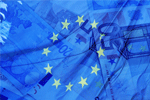 Much is at stake in the Eurozone should the fabled 'currency war' be ultimately waged as the price will be paid in both growth and jobs amidst fresh tensions about the future of the bloc itself. Few would doubt the euro area has been routed in the latest monetary battles between countries printing reserves and depressing home currencies in part to retain an acute trade advantage in a world sapped of growth.
Much is at stake in the Eurozone should the fabled 'currency war' be ultimately waged as the price will be paid in both growth and jobs amidst fresh tensions about the future of the bloc itself. Few would doubt the euro area has been routed in the latest monetary battles between countries printing reserves and depressing home currencies in part to retain an acute trade advantage in a world sapped of growth.
In Asia, Japan's plan to aggressively weaken the yen has been the proverbial warning salvo, however that merely counters the open-ended bond buying and dollar creation by the U.S. Federal Reserve, sterling printing in Britain or even Swiss intervention to cap the franc. It leaves the European Central Bank (ECB) as the last remaining constituent of the "Big Four" reserve currencies still unable or unwilling to generate new cash and sequester its exchange rate over time.
This point was underlined last month by early paybacks on what had been the ECB's proxy printing plan of cheap long-term loans to euro banks (or LTROs) – repayments, which have lead to an untimely shrinkage of the ECB balance sheet as its economy shrinks, creeping short-term interest rates and a rising euro. In just three short months, the euro has now soared a staggering +20% against Japan's yen, +8% on sterling and +7% on the US dollar – the latter compounding gains against a host of dollar-pegged, emerging currencies.
Last month, ECB chief Mario Draghi pointed out that the euro's trade-weighted index (TWI) has been better behaved and is still down more than +10% from its 2009 peaks.
However, this euro index too has jumped +6% since November and is up almost +9% since Draghi's "whatever it takes" speech in July consequently defused the bloc's sovereign debt crisis.
According to Morgan Stanley economist Elga Bartsch, “there is a risk of the euro overshooting and derailing the zone's tentative stabilization by sapping exports, capital expenditure and corporate profits – a much stronger euro could challenge the positive market vis-a-vis the periphery and structural improvements in competitiveness seen there."
One irony of course is fact that the euro's rebound is partly due to the healing of the bloc's crisis since July and the gradual resurgence of investors towards peripheral bond and equity markets, once left for dead. Though for all that relief, an expected contraction of the bloc's economy for the second straight year in 2013 means it's also the area least able to weather a currency hit right now.
Additionally, Morgan Stanley's 'ready reckoner' shows a permanent +10% euro index rise could cut -0.5% off growth over the next year and threaten to topple its forecast for a +0.5% in growth in 2013 to a loss of almost -1.0%.
Calling for a medium-term euro exchange rate target to guide policy, French President Francois Hollande on Tuesday warned of 'irrational' currency moves at odds with the underlying economy. However, with little clarity yet on what that would involve, the masses look to Draghi to ride to the rescue yet again and hope for some hint of future interest rate cuts after Thursday's ECB meeting.
Short of dramatic change to either the central bank's mandate or inflation forecasts however, few are holding their breath. At best, ING economist Carsten Brzeski reckons the euro jump "put its foot into an almost closed door towards a rate cut." In the meantime, the threat of extreme appreciation returns us to the one-size-fits-all quagmire at the heart of the euro blowout over the past three years.
Recommended Content
Editors’ Picks
AUD/USD remained bid above 0.6500

AUD/USD extended further its bullish performance, advancing for the fourth session in a row on Thursday, although a sustainable breakout of the key 200-day SMA at 0.6526 still remain elusive.
EUR/USD faces a minor resistance near at 1.0750

EUR/USD quickly left behind Wednesday’s small downtick and resumed its uptrend north of 1.0700 the figure, always on the back of the persistent sell-off in the US Dollar ahead of key PCE data on Friday.
Gold holds around $2,330 after dismal US data

Gold fell below $2,320 in the early American session as US yields shot higher after the data showed a significant increase in the US GDP price deflator in Q1. With safe-haven flows dominating the markets, however, XAU/USD reversed its direction and rose above $2,340.
Bitcoin price continues to get rejected from $65K resistance as SEC delays decision on spot BTC ETF options

Bitcoin (BTC) price has markets in disarray, provoking a broader market crash as it slumped to the $62,000 range on Thursday. Meanwhile, reverberations from spot BTC exchange-traded funds (ETFs) continue to influence the market.
US economy: slower growth with stronger inflation

The dollar strengthened, and stocks fell after statistical data from the US. The focus was on the preliminary estimate of GDP for the first quarter. Annualised quarterly growth came in at just 1.6%, down from the 2.5% and 3.4% previously forecast.